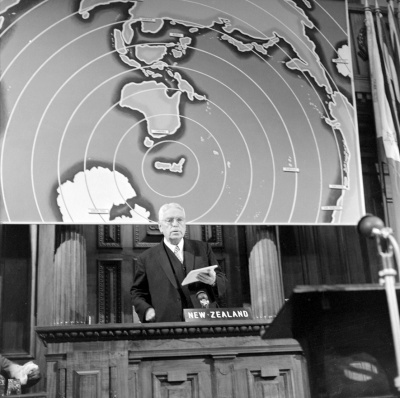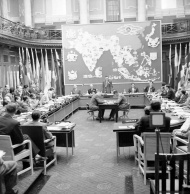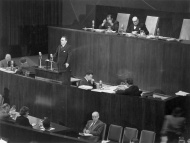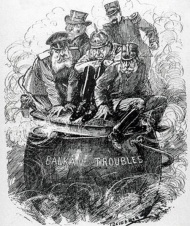Events In History
-
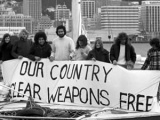 8 June 1987New Zealand goes nuclear-free
8 June 1987New Zealand goes nuclear-freeThe New Zealand Nuclear Free Zone, Disarmament, and Arms Control Act was passed into law, establishing this country as a nuclear and biological weapon-free zone Read more...
-
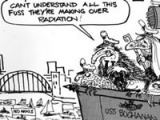 4 February 1985USS Buchanan refused entry to NZ
4 February 1985USS Buchanan refused entry to NZNew Zealand's Labour government refused the USS Buchanan entry because the United States would neither confirm nor deny that the warship had nuclear capability. Read more...
-
 28 March 1983Signing of CER agreement strengthens trans-Tasman trade ties
28 March 1983Signing of CER agreement strengthens trans-Tasman trade tiesNew Zealand and Australia formally signed the Closer Economic Relations (CER) agreement, strengthening trade ties between the Tasman neighbours. Read more...
-
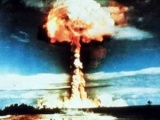 23 June 1973World Court condemns French nuclear tests
23 June 1973World Court condemns French nuclear testsThe ruling by the International Court of Justice was part of New Zealand's long campaign to end French nuclear testing in the Pacific. The French ignored the court's injunction to cease testing. Read more...
-
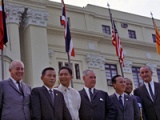 8 September 1954NZ signs Manila Pact
8 September 1954NZ signs Manila PactThe South-East Asia Collective Defence Treaty, or Manila Pact, aimed to contain the spread of communism in the region. The South-East Asia Treaty Organisation (SEATO) was the institutional expression of this treaty. Read more...
-
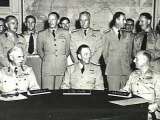 29 April 1952ANZUS treaty comes into force
29 April 1952ANZUS treaty comes into forceSigned by Australia, New Zealand and the US, the ANZUS treaty recognised that an armed attack in the Pacific area on one member would endanger the peace and safety of the others. Read more...
-
 16 August 1944CORSO formed
16 August 1944CORSO formedCORSO was set up to support aid efforts in war-torn nations. It became increasingly involved in the developing world and also spoke out about poverty in New Zealand. Read more...
-
 21 January 1944NZ and Australia sign the Canberra Pact
21 January 1944NZ and Australia sign the Canberra PactThe Canberra Pact was an undertaking by the two countries to co-operate on international matters, especially in the Pacific. Read more...
Articles
The Cold War

Although the origins of the so-called Cold War can be traced back to the Bolshevik revolution of 1917, this intense ideological struggle between the Western powers and the Soviet Union really began after the Second World War.
-
Page 2 – Overview

New Zealand’s participation in the Cold War was shaped by its decision to support the Western powers in their confrontation with the Soviet Union after the Second World War.
-
Page 3 – Choosing sides
New Zealand backed Britain and the United States against the Soviet Union as the Cold War began in the late 1940s. Like the other Western Allies, New Zealand’s relationship
-
Page 4 – Treaties and alliances
During the 1940s and 1950s New Zealand signed a series of collective treaties with Britain and the United States aimed at countering the threats of Japanese military resurgence
-
Page 5 – South-East Asia
During the 1950s the focus of New Zealand’s defence strategy shifted from the Middle East to Asia.
-
Page 7 – Last decade
Soviet-American tensions revived in the late 1970s as ‘détente’ (co-operation) gave way to a renewed arms race.
Nuclear-free New Zealand

The sinking of the Greenpeace protest ship Rainbow Warrior in Auckland in July 1985 shocked the nation. The incident galvanised an anti-nuclear movement that had emerged in opposition to both French nuclear tests at Mururoa and American warship visits to New Zealand.
-
Page 4 – Nuclear-free legislation
Labour leader David Lange tried to work with the Americans, but their 'neither confirm nor deny' policy made a middle ground virtually impossible to find.
-
Page 5 – Sinking the Rainbow Warrior
In 1985 New Zealand was basking in its position as leader of the anti-nuclear movement. Then on 10 July, two explosions set by French Secret Service agents ripped through the
New Zealand and the United Nations

New Zealand has a tradition of commitment to the concept of collective security. It was a member of the League of Nations between the world wars and was active in the establishment of the United Nations in June 1945.
-
Page 2 – The League of Nations
New Zealand was a founding member of the League of nations and was awarded German Samoa as a Mandated Territory by the League.
-
Page 3 – Participation in the United Nations
The United Nations Charter established six principal organs to achieve its aims. New Zealand has played a part in all of these organs.
-
Page 4 – Universal Declaration of Human Rights
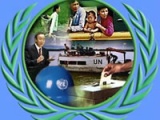
In 1950 the United Nations General Assembly passed a resolution to adopt 10 December as Human Rights Day. New Zealand has participated actively in human rights deliberations at
First World War - overview

Archduke Franz Ferdinand, heir to the throne of the Austro-Hungarian Empire, and his wife Sophie were assassinated in the Bosnian city of Sarajevo. This was a key event in sparking the Great War of 1914–18.
-
Page 6 – The legacy of war
The war had a major impact on constitutional arrangements within the British Empire, and it affected New Zealand's international status.
Capture of German Samoa

When war broke out in Europe in August 1914, Britain asked New Zealand to seize German Samoa as a ‘great and urgent Imperial service’. Although the tiny German garrison offered no opposition, at the time it was regarded as a potentially risky action.
- Page 2 - New Zealand in the PacificSamoans were not consulted when Britain, Germany and the United States agreed to partition their islands in December
-
This case study examines New Zealand's involvement in the nuclear debate of the 1970s and 1980s, culminating in a breakdown of the ANZUS alliance in 1985. With
Biographies
-
 Nash, Walter
Nash, Walter
At almost 76, Walter Nash was New Zealand’s oldest incoming PM and the last foreign-born one. He had two wives, Lotty, and Parliament. He was still an MP when he died aged 86.
Read more... -
 Allen, James
Allen, James
As Minister of Defence from 1912 until 1920, James Allen was responsible for the organisation of New Zealand’s military forces during the First World War.
Read more...
Related keywords
- vietnam war
- SEATO
- wellington city
- walter nash
- cold war
- parliament
- 1950s
- protest
- pacifism
- nuclear free
- david lange
- united nations
- australia
- WW2
- economy
- international trade
- CER
- corso
- james allen
- dunedin
- WW1
- MPs
- reform party
- navy
- nuclear ships
- anzus
- france
- league of nations
- samoa
- treaties
- german samoa occupation
- british empire
- pacific islanders
- korean war
- peter fraser
- communism
- malayan emergency
- singapore
- borneo confrontation
- soviet union
- viet cong
- chinese
- royal new zealand air force
- united states
- prime ministers
- labour party
- waterfront dispute
- human rights
- carl berendsen
- german navy
- national identity
- belgium
- lord liverpool
- serbia
- austro-hungarian empire
- cartoon
- ottoman empire
- balkans
- 1980s
- americans
- shipping
- rainbow warrior bombing
- greenpeace
- mururoa protest
-
Main image: SEATO Council meeting in Wellington, 1959
New Zealand Prime Minister Walter Nash addresses South East Asia Treaty Organisation (SEATO) Council meeting in Wellington, 1959.

